According to the ancient Babylonians there was an inundated Field at our Square of Pegasus - in contrast to the very dry Land at the opposite side of the sky, where the celestial waters had ran down all the way to the Abyss, located below our black bird Raven (Corvus).

Here they had put the sign of a new beginning

with Mercury (29 - 28 = 1) corresponding to the first black night (•) of the Moon (Ohiro).
... Ganz ähnlich is der Name 'Gott von Duazag' des Gottes Nabū ... zu erklären. Er bezeichnet ihn als den Gott des Wachtstums, welches als aus dem Osten stammend betrachtet wird, weil die Sonne, die das Wachstum bringt, im Osten aufgeht. Dass aber Nabū als Ost-Gott aufgefasst wurde, hängt damit zusammen, dass sein Stern, der Mercur, nur im Osten oder Westen sichtbar ist ...
| Hiro 1. A deity invoked when praying for rain (meaning uncertain). 2. To twine tree fibres (hauhau, mahute) into strings or ropes. Ohirohiro, waterspout (more exactly pú ohirohiro), a column of water which rises spinning on itself. Vanaga.
To spin, to twist. P Mgv.: hiro, iro, to make a cord or line in the native manner by twisting on the thigh. Mq.: fió, hió, to spin, to twist, to twine. Ta.: hiro, to twist. This differs essentially from the in-and-out movement involved in hiri 2, for here the movement is that of rolling on the axis of length, the result is that of spinning. Starting with the coir fiber, the first operation is to roll (hiro) by the palm of the hand upon the thigh, which lies coveniently exposed in the crosslegged sedentary posture, two or three threads into a cord; next to plait (hiri) three or other odd number of such cords into sennit. Hirohiro, to mix, to blend, to dissolve, to infuse, to inject, to season, to streak with several colors; hirohiro ei paatai, to salt. Hirohiroa, to mingle; hirohiroa ei vai, diluted with water. Churchill.
Ta.: Hiro, to exaggerate. Ha.: hilohilo, to lengthen a speech by mentioning little circumstances, to make nice oratorial language. Churchill.
Whiro 'Steals-off-and-hides'; also [in addition to the name of Mercury] the universal name for the 'dark of the Moon' or the first day of the lunar month; also the deity of sneak thieves and rascals. Makemson. |
Here there was no Moon light in the night and people had to use their hands spread out in front of them for feeling their way around.
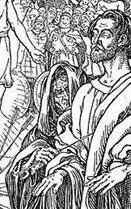
Höder, who was blind also in daytime, could therefore be tricked into shooting an arrow made of mistletoe at his illustrious brother Balder (Hercules), thus killing him.
... Hercules first appears in legend as a pastoral sacred king and, perhaps because shepherds welcome the birth of twin lambs, is a twin himself. His characteristics and history can be deduced from a mass of legends, folk-customs and megalithic monuments. He is the rain-maker of his tribe and a sort of human thunder-storm. Legends connect him with Libya and the Atlas Mountains; he may well have originated thereabouts in Palaeolithic times. The priests of Egyptian Thebes, who called him Shu, dated his origin as '17,000 years before the reign of King Amasis'. He carries an oak-club, because the oak provides his beasts and his people with mast and because it attracts lightning more than any other tree. His symbols are the acorn; the rock-dove, which nests in oaks as well as in clefts of rocks; the mistletoe, or Loranthus; and the serpent. All these are sexual emblems. The dove was sacred to the Love-goddess of Greece and Syria; the serpent was the most ancient of phallic totem-beasts; the cupped acorn stood for the glans penis in both Greek and Latin; the mistletoe was an all-heal and its names viscus (Latin) and ixias (Greek) are connected with vis and ischus (strength) - probably because of the spermal viscosity of its berries, sperm being the vehicle of life. This Hercules is male leader of all orgiastic rites and has twelve archer companions, including his spear-armed twin, who is his tanist or deputy. He performs an annual green-wood marriage with a queen of the woods, a sort of Maid Marian. He is a mighty hunter and makes rain, when it is needed, by rattling an oak-club thunderously in a hollow oak and stirring a pool with an oak branch - alternatively, by rattling pebbles inside a sacred colocinth-gourd or, later, by rolling black meteoric stones inside a wooden chest - and so attracting thunderstorms by sympathetic magic ...
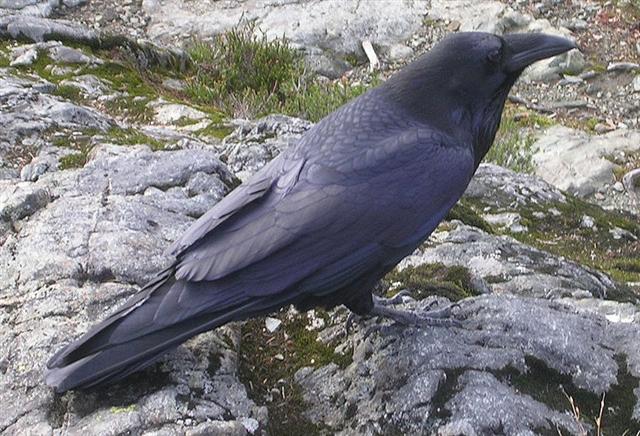
... the bird, being sent with a cup for water, loitered at a fig-tree till the fruit became ripe, and then returned to the god with a water-snake in his claws and a lie in his mouth, alleging the snake to have been the cause of the delay. In punishment he was forever fixed in the sky with the Cup and the Snake; and, we may infer, doomed to everlasting thirst by the guardianship of the Hydra over the Cup and its contents. From all this came other poetical names for our Corvus - Avis Ficarius, the Fig Bird; and Emansor, one who stays beyond his time; and a belief, in early folk-lore, that this alone among birds did not carry water to its young ...

| JULY 2 |
3 (*104) |
4 (185) |
 |
 |
 |
| Ga4-20 |
Ga4-21 (104) |
Ga4-22 |
|
CLOSE TO THE SUN: |
| 11h (167.4) χ Leonis, χ¹ Hydrae (167.1), χ² Hydrae (167.3) *167.4 - *41.4 = *126.0 |
AL SHARAS (The Ribs) = β Crateris (168.6) |
Al Zubrah-9 (Mane) / Purva Phalguni-11 (First Reddish One - Fig Tree)
ZOSMA (Girdle, not Belt) = δ Leonis (169.2), COXA (Hips) = θ Leonis (169.4)
*169.4 - *41.4 = *128.0 |
|
... God created Eve from one of Adam's ribs and therefore I at first tried to translate the female (β) star name Al Sharas with The Rib. Although according to Allen this star was plural: '... β ... was one of Al Tizini's Al Sharāsīf, the Ribs, - i.e. of the Hydra, - and the first of the set.' Adam had, as I remember it, another wife before Eve, viz. Lilith ... |
| Sept 4 |
5 (248 = 104 + 144) |
6 (185 + 64 = 249) |
| °Aug 31 |
°Sept 1 (244) |
2 |
| 'Aug 8 (*140 = *167 - *27) |
9 |
10 (222 = 185 - 27) |
| "July 25 (*126) |
26 |
27 (144 = 185 - 41) |
| DAY 167 |
168 (= 24 * 7) |
169 |
| CLOSE TO THE FULL MOON: |
| JAN 1 |
2 |
3 (368) |
| 23h (350.0)
υ, θ Gruis (350.0), π Cephei (350.6), ι Gruis (350.9) |
SIMMAH = γ Piscium (351.7) |
φ Aquarii (352.0), ψ Aquarii (352.4), χ Aquarii (352.6), γ Tucanae, φ Gruis (352.8)
*352.4 - *41.4 = *311.0 |
| March 6 (*350) |
7 (66) |
8 (432) |
| °March 2 (*346) |
3 |
4 (63) |
| 'Febr 7 |
8 (*324) |
9 (40) |
| "Jan 24 |
25 (*310) |
26 |
| DAY 350 |
351 (= 27 * 13) |
352 |
| LEO: |
| 10 |
Maghā the bountiful |
α Leonis Regulus |
Royal Throne |
Aug 20 (232) |
| 11 |
Purva Phalguni first reddish one |
δ and θ Leonis
Zosma and Coxa |
Front legs of bed, hammock, fig tree |
Sept 6 (249) |
| 12 |
Uttara Phalguni second reddish one |
β Leonis Denebola |
Four legs of bed, hammock |
Sept 15 (258) |
The Babylonian Great One - evidently ruling the streams of flowing water - may have evolved into the person who became our Aquarius, although the left hand no longer holds a current of fresh water (vai ora) but rather what looks like a dry towel:
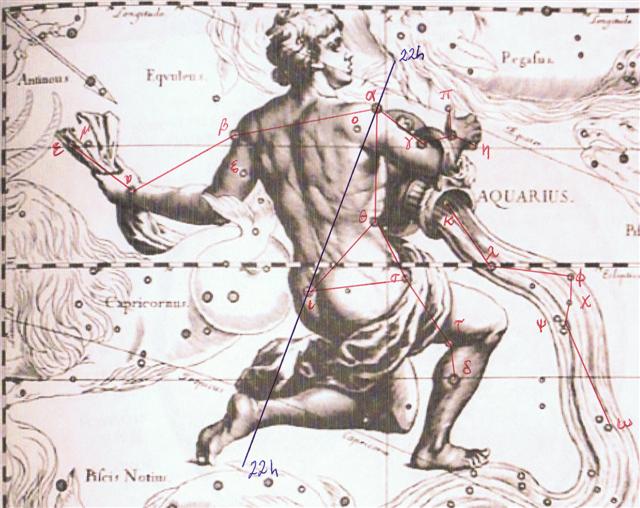
| Ora 1. Healthy; to recover, to be saved (from an illness or a danger): ku-ora-á, ina kai mate, he recovered, he did not die; ku-ora-á te haoa, the wound has healed; e-ora-no-á, he is still alive; ora-hakaou mai, to come back to life; ora ké, what a pleasant breeze! (lit: how healthy!). 2. Stick for spinning top (made from the shell of a sandalwood nut) with which children make the top spin. Vanaga.
1. December, January. Ora nui, November, October. 2. To live, to exist, to draw breath, to survive, to subsist, to be well, healthy, safe, to refresh, a pause, rest, ease; e ko ora, incurable; ora tuhai, previous existence; ora iho, to resuscitate, to revive; ora nui, vigorous; oraga, life, existence; oraga roaroa, oraga roaroa ke, oraga ina kai mou, immortality; oraga kore, lifeless; oraga mau, oraga ihoiho, vivacious; oraora, oraora no iti, to be better; hakaora, to draw breath, to revive, to strengthen, healthy, to sanctify, to animate, to save, to repose, to cure, to rest, to comfort, to assuage; hakaora ina kai mou, to immortalize; hakaoratagata, Messiah, Saviour. 3. To give water to; kua ora te kevare, to water a horse; hakaunu ora, to water. 4. To staunch, to stop the flow of a liquid. 5. To make an escape; hakaora, to discharge, to deliver, to set free. 6. To be awake (probably ara); hakaora to guard. 7. A zephyr, light wind; kona ora, a breezy spot; ahau ora, agreeable breeze. Churchill.
Ola, life, health, well-being, living, livelihood, means of support, salvation; alive, living; curable, spared, recovered, healed; to live; to spare, save, heal, grant life, survive, thrive. Ola loa, long life, longevity, Ola 'ana, life, existence. Wehewehe.
The explorers reach Easter Island in a 'canoe' (vaka). The name of their craft is given as Oraorangaru 'saved from the billows' (Brown 1924:40) or Te Oraora-miro 'the living-wood' (ME:58). The Routledge reference 'Each (man went) on a piece of wood' (RM:278) also seems to refer to the name of the canoe. As far back as 1934, the name was no longer understood. I favor the following explanation: The difficulty in interpreting the name of the canoe of the explorers arises from the name segment oraora. To begin with, the compound form oraora ngaru should be analyzed in comparison with other Polynesian compounds, such as MAO. pare-ngaru 'that which fends off the waves' (i.e., the hull of the boat), TAH. tere-'aru 'that which moves through the waves' (i.e., riding the waves on a board). There are several possible translations for oraora as the reduplication of ora. Te Oraora Miro can be translated as 'the pieces of wood, tightly lashed together' (compare TAH. oraora 'to set close together, to fit parts of a canoe') and be taken to refer to the method of construction of the explorer canoe, while Oraora Ngaru means 'that which parts the water like a wedge', or 'that which saves (one) from the waves, that which is stronger than the waves'. (Barthel 2) |
The stream of fresh water from the Urn, hanging at the right elbow of Aquarius, ran down into the Mouth of the Fish (Fom-al-Haut):
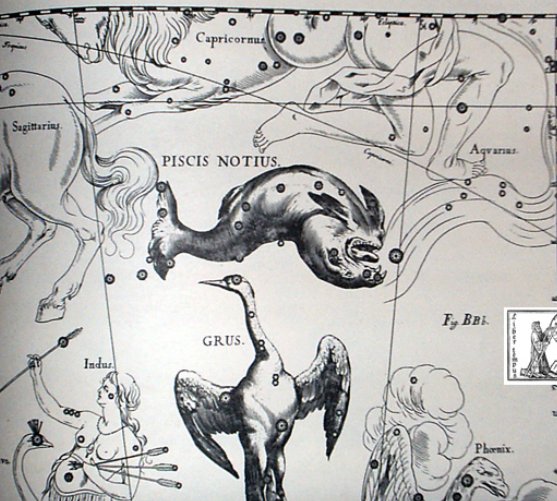
| JUNE 28 |
29 (180) |
30 (SIRIUS) |
JULY 1 (*102) |
 |
 |
 |
 |
| Ga4-16 |
Ga4-17 (100) |
Ga4-18 |
Ga4-19 |
| CLOSE TO THE SUN: |
| ν Hydrae (163.1) |
no star listed (164)
ALTAIR (α Aquilae)
|
Wings-27 (Snake)
η Octans (165.4), ALKES (Shallow Basin) = α Crateris (165.6)
*124.0 = *165.4 - *41.4 |
ANA-TIPU-4 (Upper-side-pillar - where the guards stood)
MERAK (Loin, not Lion) = β Ursae Majoris
(166.2),
DUBHE (Bear) = α Ursae Majoris (166.7) |
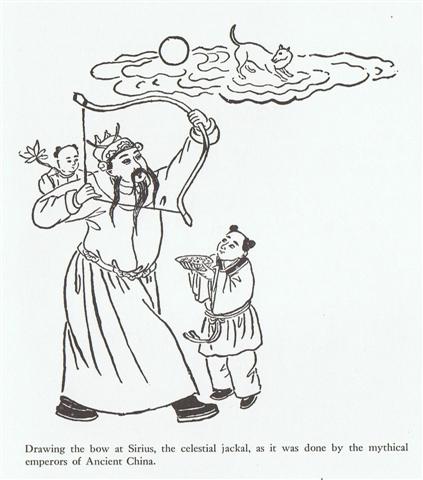 |
| Aug 31 |
Sept 1 |
2 (7 * 35) |
3 (246) |
| °Aug 27 |
28 |
29 (*161) |
30 (242 = 11 * 22) |
| 'Aug 4 (216) |
5 (*137) |
6 |
7 |
| "July 21 |
22 / 7 |
23 |
24 (*125) |
| DAY 163 |
164 |
165 (= 11 * 15) |
166 (= 182 - 16) |
| CLOSE TO THE FULL MOON: |
| DEC 28 |
29 (363 = 11 * 33) |
30 |
31 (*285) |
| ι Cephei (346.0), λ Aquarii, γ Piscis Austrini, σ Pegasi (346.5) |
SCHEAT AQUARII = δ Aquarii (347.0), ρ Pegasi (347.2), δ Piscis Austrini (347.4), FOMALHAUT (Mouth of the Fish) = α Piscis Austrini, τ Gruis (347.8) *306.0 = *347.4 - *41.4 |
FUM AL SAMAKAH (Mouth of the Fish) = β Piscium (348.3), ζ Gruis (348.5), ο Andromedae (348.9) |
Al Fargh al Mukdim-24 (Fore Spout) / Purva Bhādrapadā-26 (First of the Blessed Feet) / House-13 (Pig)
SCHEAT PEGASI = β Pegasi, π Piscis Austrini (349.3), κ Gruis (349.4), MARKAB PEGASI = α Pegasi (349.5)
*308.0 = *349.4 - *41.4 |
| March 2 |
3 |
4 (7 * 9) |
5 (64) |
| °Febr 26 |
27 |
28 (*344) |
°March 1 (60) |
| 'Febr 3 |
4 |
5 (36) |
6 (*322) |
| "Jan 20 |
21 |
22 |
23 (*308) |
| DAY 346 |
347 |
348 (= 12 * 29) |
349 (= 365 - 16) |
... There was no water in the village. The lakes and rivers were dry. Raven and Crow, two young girls who were having their first menstrual courses, were told to go and draw water from the ocean. Finding the journey too long, Raven decided just to urinate into her basket-bucket. She decieved no one and was severly scolded. Crow returned much later but with drinking water. As a punishment, Raven was condemned never to find water in the summer; only in winter would she find something to drink. For that reason the Raven never drinks during the hot months; she speaks with a raucous voice because of her dry throat ...
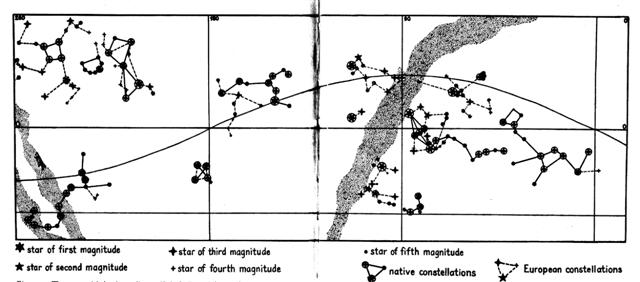
|













